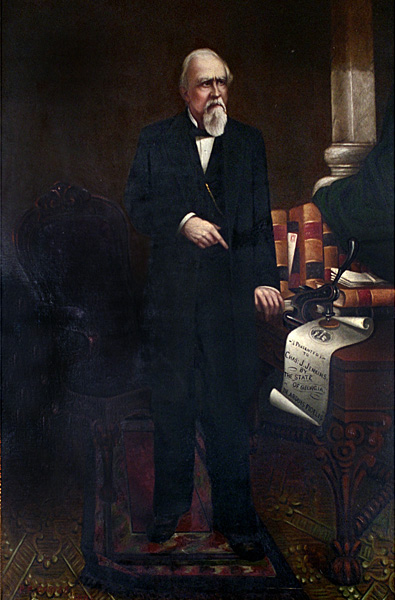Charles J. Jenkins
Charles Jones Jenkins (born January 6, 1805 in Beaufort , South Carolina , † June 14, 1883 in Augusta , Georgia ) was an American politician and governor of the state of Georgia from 1865 to 1868.
Early years and political advancement
In 1816 his family moved to Georgia and settled in Jefferson County . The young Charles first attended the University of Georgia , but he did not graduate there. He obtained this in 1824 at Union College in Pennsylvania .
In 1830 he was elected as a Democrat to the Georgia House of Representatives. He later switched to the Whigs . Between 1831 and 1834 he was Attorney General and Public Prosecutor at the same time . With a few interruptions he was a member of the Congress of Georgia until 1850 and temporarily as Speaker President of the House. In 1850 he wrote the so-called "Georgia Platform". This document was adopted at a convention against the will of then Governor George W. Towns . It supported the compromise of 1850 and refused to allow Georgia to leave the Union.
In 1852 , Jenkins ran alongside Daniel Webster for the vice presidency. They ran for the Union Party , a short-lived party founded by former Whigs. However, the elections were lost. With only 6,994 votes nationwide, which corresponded to a share of 0.2 percent, Webster and Jenkins took only fourth place behind the victorious Democrat Franklin Pierce , Whig candidate Winfield Scott and John P. Hale of the Free Soil Party .
Before the election, Jenkins had turned down a cabinet post under President Millard Fillmore . In 1853 he unsuccessfully applied for the post of governor of Georgia. In early 1856 he was elected to the Georgia Senate and in 1860 was appointed a judge of the Supreme Court of Georgia by Governor Joseph E. Brown . He kept this position until the end of the civil war. At the Convention that decided Georgia to leave the Union in 1861, he was initially reluctant. When the majority then voted for secession, he then joined it unconditionally.
Georgia Governor
During the war he exercised his office as judge, which he took up in 1860. After the war he was one of the driving forces behind the constituent congress in October 1865. That assembly annulled the secession decision of 1861 and passed a new constitution. In November 1865, he was elected governor of Georgia. He held this office until 1868. When he took office, the state of Georgia was deeply in debt and nearly bankrupt due to the war. Within two years he made a significant improvement in this area. Then, however, he quarreled with the federal government in Washington. He rejected the 14th Amendment to the Constitution , which gave the former slaves civil rights, and fought against the Federal Government's Reconstruction Act .
When General George G. Meade , the commanding officer in occupied Georgia, asked him to call a meeting to approve federal law, Jenkins and his Treasury Secretary, John Jones, refused to obey. General Meade then removed him from his office and replaced him with General Thomas H. Ruger , who then served as military governor. Jenkins and Jones fled Georgia. However, they took the state insignia and important documents with them on their escape. The Treasury Secretary put $ 400,000 in a bank account in New York. In exile, the ex-governor called the US Supreme Court, but the US Supreme Court refused to hear his case. After two years, he returned to Georgia in 1870. When in 1872 a Democrat, James Milton Smith , was elected as the new governor, he handed over the property, which had been kidnapped in 1868, to him as the “first legal successor in office”.
According to him, this is Jenkins County , Georgia named.
Old age and death
In 1877 he was once again chairman of a new constituent convention. Otherwise he withdrew from the public. He died in Augusta in June 1883. He had three children with his first wife, Sarah Seaborn Jones. In his second marriage he was married to Emily Gertrude Barnes.
literature
- James F. Cook: The Governors of Georgia, 1754-2004. 3rd edition, Mercer University Press, Macon (Georgai) 2005.
- Olive H. Shadgett: Charles Jones Jenkins, Jr. In: Horace Montgomery (Ed.): Georgians in Profile: Historical Essays in Honor of Ellis Merton Coulter. University of Georgia Press, Athens 1958.
Web links
- The New Georgia Encyclopedia (English)
- Charles J. Jenkins in the database of Find a Grave (English)
- Charles J. Jenkins in the National Governors Association (English)
| personal data | |
|---|---|
| SURNAME | Jenkins, Charles J. |
| ALTERNATIVE NAMES | Jenkins, Charles Jones (full name) |
| BRIEF DESCRIPTION | American politician |
| DATE OF BIRTH | January 6, 1805 |
| PLACE OF BIRTH | Beaufort , South Carolina |
| DATE OF DEATH | June 14, 1883 |
| Place of death | Augusta , Georgia |

